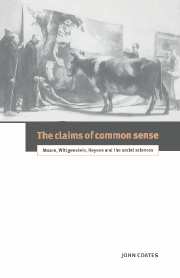Book contents
- Frontmatter
- Contents
- Preface
- Introduction
- 1 A short history of common sense
- 2 Ideal languages and vague concepts: the transition in Cambridge philosophy
- 3 Keynes and Moore's common sense
- 4 Keynes's later views on vagueness and definition
- 5 Samples, generalizations, and ideal types
- 6 The Cambridge philosophical community
- Conclusion: complexity, vagueness, and rhetoric
- Index
3 - Keynes and Moore's common sense
Published online by Cambridge University Press: 19 September 2009
- Frontmatter
- Contents
- Preface
- Introduction
- 1 A short history of common sense
- 2 Ideal languages and vague concepts: the transition in Cambridge philosophy
- 3 Keynes and Moore's common sense
- 4 Keynes's later views on vagueness and definition
- 5 Samples, generalizations, and ideal types
- 6 The Cambridge philosophical community
- Conclusion: complexity, vagueness, and rhetoric
- Index
Summary
Many of the concepts and lines of argument that characterized later Cambridge philosophy show up in Keynes's philosophical and methodological writings from the time. He too focused on the property of vagueness and the problems it presented to the formalisation of everyday language. In the next chapter I look at Keynes's own departure from the early ideals of analytic philosophy, and at how he incorporated the new ideas into his philosophy of the social sciences. However, by first looking at Keynes's early thought, particularly some overlooked marginalia in the Treatise on Probability, we can see that his later position had its roots securely in Moore's common sense philosophy.
In the Treatise on Probability Keynes was working squarely within the analytic tradition, extending Russell's account of the logical relationship between “intuitive knowledge” and “derivative knowledge” to the realm of probable knowledge. However, he expressed doubts about many of the core assumptions of analysis. The prime concern on the part of commentators with judging whether Keynes was successful in providing logical foundations for probable knowledge has drawn attention away from those aspects of his philosophy that presaged ordinary language philosophy. Looking at those aspects enables us to see that Keynes enjoyed a critical distance from the epistemic ideals informing the methods then being developed in both philosophy and economics. In Wittgenstein's later philosophy Keynes found a logical vindication of his earlier reservations, one he no longer had time to provide. As we will see when we turn to the biographical details in chapter 6, Keynes took greater interest in Wittgenstein's philosophy when their views on the problems of formalization converged.
- Type
- Chapter
- Information
- The Claims of Common SenseMoore, Wittgenstein, Keynes and the Social Sciences, pp. 62 - 77Publisher: Cambridge University PressPrint publication year: 1996



